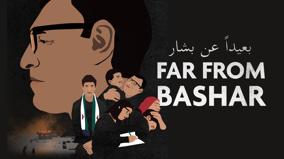New release
Coming
None
 Je pleure dans ma tête (Les traumas par les mots)
Je pleure dans ma tête (Les traumas par les mots)
2022
1 h 15 min
Leaving soon
Comment réussir l’intégration scolaire des enfants réfugiés au Québec, en tenant compte des violences indicibles qu’ils ont vécues ? En suivant une psychologue spécialisée dans les traumatismes de guerre, Je pleure dans ma tête rend hommage à l’admirable résilience et aux stratégies de survie de ces « petits adultes » que les bombes et les camps n’ont pas totalement brisés, à une époque où il est crucial de sensibiliser les sociétés occidentales aux enjeux liés à la migration et aux droits des enfants.

Details
Comment réussir l’intégration scolaire des enfants réfugiés au Québec, en tenant compte des violences indicibles qu’ils ont vécues ? En suivant une psychologue spécialisée dans les traumatismes de guerre, Je pleure dans ma tête rend hommage à l’admirable résilience et aux stratégies de survie de ces « petits adultes » que les bombes et les camps n’ont pas totalement brisés, à une époque où il est crucial de sensibiliser les sociétés occidentales aux enjeux liés à la migration et aux droits des enfants.
-
participationGarine Papazian-ZohrabianArezki TerkemaniMandjey KamaraAlia AbedGeneviève CardinalSuzanne Des MaraisMartin DesprésLauriane El BoustanyMaya El NassranyDjessira KouroumaNoor MichaelAbdul-AzizBezaleelDjemga Keny DaveLinaLyneMeraMoustaphaNadaNaiaNajiNathanaëlSafaSangeethYasmineZakariaZenaAmerHibaIshakMarleyMounaNihalOuiamRominaValentinaYacineYalasYolande
-
researchHélène Magny
-
NoneHélène MagnyGeneviève ThibertÉvangéline de PasAlain OstiguyCynthia OuelletSerge VerreaultJérémie JonesLuc LégerEric BondoJoëlle Lapointe
-
directionHélène Magny
-
producerNathalie Cloutier
-
editingMichel Giroux
-
imagesArnaud Bouquet
-
location soundLynne TrépanierDimitri Médard
-
sound designBenoît DameCatherine Van Der Donckt
-
supplementary footageElie BachaalanyWissam Charaf
-
additional soundMélanie GauthierSimon PlouffeGeneviève Thibert
-
drone imagesDrone Box
-
technical support - editingPierre DupontMarie-Josée GourdePatrick Trahan
-
translationSami BasbousEli Jean Tahchi
-
transcriptsDifuze inc.
-
online editingSerge Verreault
-
dialog editingLori Paquet
-
sound effects creationStéphane Cadotte
-
foleyLuc Léger
-
sound mixerJean Paul Vialard
-
original musicSami Basbous
-
musicianCasey FultonFrédérique Tanguay-GagnonSadio Sissokho
-
music recordingGeoffrey Mitchell
-
music mixGeoffrey Mitchell
-
negociation of additional musicLucie Bourgouin
-
legal counselJulie Patry
-
marketing officerGeneviève BérardKarine SévignyNathalie Guérard
-
administratorSia Koukoulas
-
production coordinatorAlexandra BourqueCoralie DumoulinChinda Phommarinh
-
studio coordinatorGabrielle Dupont
-
technical coordinatorDaniel ClaveauMira Mailhot
-
delegate producerMélanie Lasnier
-
executive producerNathalie Cloutier
Education
Ages 16 to 18
Mini-lessons
School subjects
















